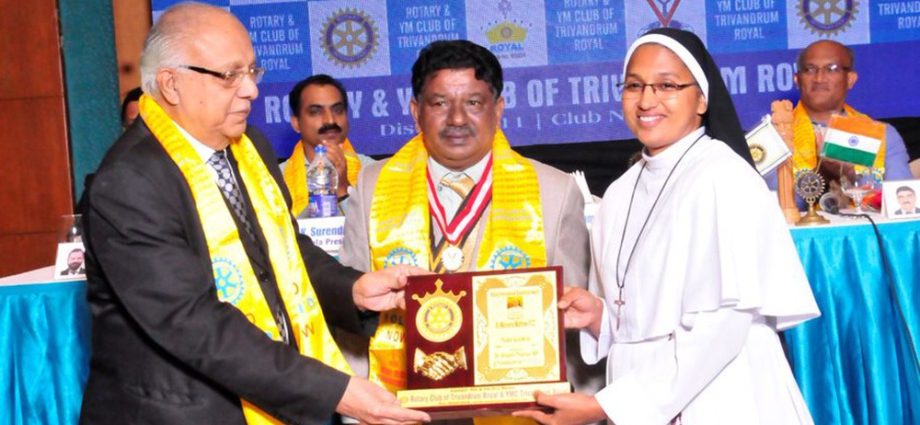By George Kommattam
Kasaragod, Feb 15, 2025: Keerthi Ramakrishnan, a Hindu woman in Kerala, is grateful for a Catholic nun who helped lift her from a life of despair.
“My life was shattered when I came to know my son Kashi was unable to walk or talk. Now, I have hope because of Sister Mareena [Mathew],” the resident of Enmakaje village in Kerala’s Kasaragod district, told Global Sisters Report.
Keerthi enrolled her 4-year-old son in a school for children whom many believe have been impacted by endosulfan. (She is among hundreds of mothers in Kasaragod also living with various disabilities linked to pesticide use.)
Beginning in the 1970s, the Plantation Corporation of Kerala sprayed endosulfan across 4,696 hectares of cashew plantations in Kasargod District of Kerala, which, according to government reports, has been linked to severe health and environmental damage.
According to The Guardian, doctors who visited the area in the late ’80s “began to notice a variety of health problems, particularly among children, and began to suspect endosulfan was to blame. Subsequent studies — contested by the industry — linked endosulfan to damage to the central nervous system and hormonal changes in mothers and babies.”
Despite protests and legal action, authorities ignored the issue. In 2001, the government finally banned endosulfan use in plantations.
Keerthi and her son now find solace with Navajeevana Endosulfan Special School. Navajeevana (“New Life” in the Kannada language), was established by Norbertine priests in 2017 at Bedrampalla, and is managed in collaboration with Sister Mareena’s congregation.
“Navajeevana has become a lifeline for distraught families in Enmakaje and surrounding villages,” said J.S. Somasekara, president of the local panchayat (village council).
Nearly 700 of his panchayat’s 6,000 families have someone living with disabilities, believed to have been affected by endosulfan.
These families grapple with financial and emotional burdens to raise their children, the Hindu politician said.
The Catholic center has given children a chance to live with dignity and joy through free education, therapy and outreach programs.
“This center is a blessing for our panchayat. What Sister Mareena [Mathew] is doing is service, not for money, but out of pure love. Her work has brought life to many families here,” Somasekara observed.
Sister Mareena, a Franciscan Clarist nun, says the center is her heaven on earth.
As children dressed in bright uniforms crowded around her, the 50-year-old nun recalled her congregation coming to Kasaragod at the invitation of the Norbertine priests.
Her province’s chapter accepted the invitation in 2017 and deputed Sisters Mareena and Jeena, an older nun, to serve the Norbertine center.
“I didn’t fully understand what it would entail, but I agreed,” Sister Mareena told GSR.
She said she was drawn to helping the poor and the sick as a member of the Jesus Youth, an international movement, before joining the convent.
“When we came here, I knew this was my calling, and I am totally satisfied. I see Jesus in them,” said Sister Mareena, who had previously served in homes for the aged, street children and HIV patients in other parts of Kerala.
In October, the Missionary Congregation of the Blessed Sacrament awarded her for her “selfless service” to the residents living with disabilities and disorders in the Kasaragod District.
The center currently serves 80 non-Christian children, visits 30 bedridden children at their homes and offers essential care to their families.
Sisters Shilpa Baby and Jaicy Isaac help care for the children. Sister Shilpa was Sister Mareena’s student during her training period.
When the last national census was taken in 2011, Hindus formed nearly 56 percent of the district’s population of more than 1.3 million. Muslims accounted for more than 37 percent, and Christians almost 7 percent.
Sister Mareena said the center helps children like Kashi become self-supporting and “regain their lives as much as possible, and their families find hope.”
Norbertine Father Jose Chembottikkal, the director of Navajeevana, said they opened the center because no facility existed to care for endosulfan-affected children.
His congregation originally entered Kasaragod, a district bordering Karnataka state in the north, to start a college. “But seeing the plight of the parents and victims, we changed the plan.”
The cashew plantation owners, the priest explained, began using endosulfan, creating a public health disaster in the region.
Despite government bans and compensation programs, many families still struggle.
As the plight of Kasaragod hit the headlines, the Archdiocese of Tellicherry, which covers the region, opened a care center. However, they could not sustain it, Father Chembottikkal recalled.
“Initially, Navajeevana was a care center, but we soon realized we could not meet the needs of these children alone.”
So, they invited several women congregations for help, but none took up the challenge. “Finally, we turned to the Clarist congregation,” the priest said.
With the Clarist nuns’ collaboration, Navajeevana grew into a specialized facility that offers life-changing care to families.
Sister Mareena said Navajeevana brought great relief to mothers like Keerthi and Fathima Muhammed, a Muslim, who were confined to their homes because of their children.
“Navajeevana has brought much relief to my family,” Fathima told GSR. Her 3-year-old son, who cannot walk, receives daily physiotherapy at the Catholic center.
The center’s bus picks up their children for school, allowing parents to go to work.
Sister Mareena and her team treat each child with love and respect, helping them discover their unique talents, said novelist Ambikasuthan Mangad, who chronicled the tragedy blamed on endosulfan in a Malayalam novel titled Enmakaje.
He added that Sister Mareena’s compassion and leadership have changed peoples’ attitudes toward children with disabilities.
“What Sister Mareena and her team are doing is not just social work. It is a prayer. These children are happiest at Navajeevana,” the novelist told GSR.
He also pointed out that the Catholic center’s inclusive approach has bridged cultural and religious divides in the region. Parents of all backgrounds find solace and support in the center, he said.
The center teaches children skills such as making cleaning solutions or managing chicken farms that help them save and earn money.
Rafeeque, a speech-impaired teenager making cleaning lotion, said, “I am happy, happy,” when GSR asked him about his life in Navajeevana.
“When we see the children learn skills, laugh and help each other, we know we are making a difference,” Sister Mareena said. The center has gone beyond therapy and education to create a sense of community among the local people, she added.
Sister Mareena coauthored a book with Norbertine Father Vipin Baby Vayalil on this problem said to be linked to endosulfan. Royalties from The Warriors of Enmakaje partially fund the center. Their support primarily comes from the Norbertine congregation. Local people also help occasionally.
Families that had earlier remained isolated now find strength and support, and their children in need receive love and care. For all of them Navajeevana lives up to its name.
(George Kommattam is a journalist, entrepreneur and editor of the Kerala Catholic Online. He was a reporter of Union of Catholic Asian News and now Matters India. He is the managing director of Water Creative Studio, an award-winning branding and creative agency in Kozhikode, Kerala. He is a rank holder in mass communication from the University of Calicut, Kerala. This article was first published in globalsistersreport.org on February 13, 2025.)










